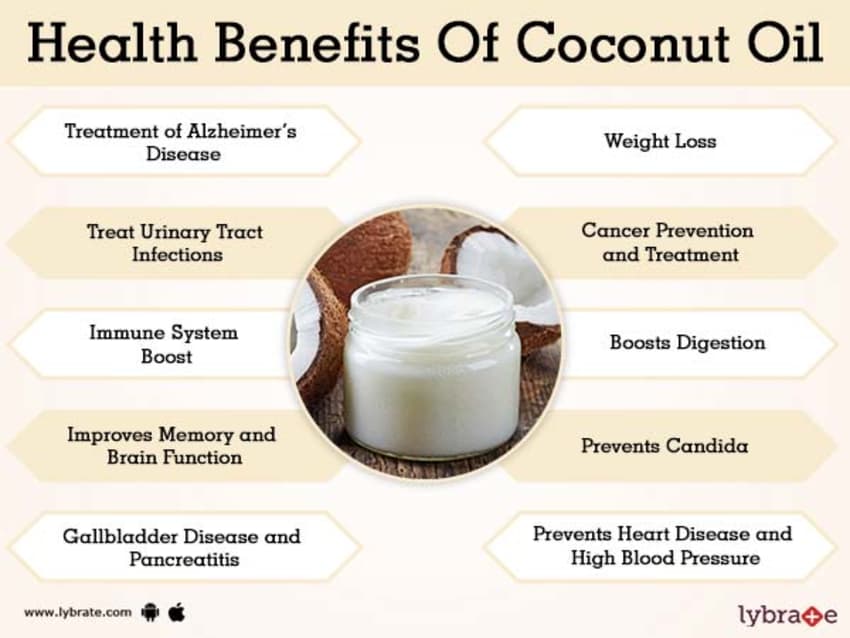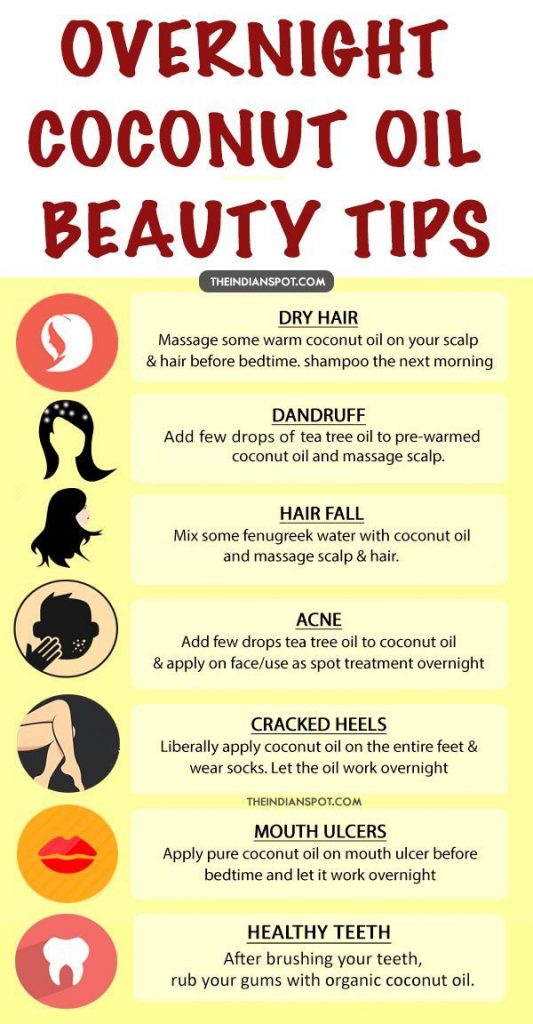
Coconut Oil: Health and Skin Benefit of Coconut Oil
Coconut oil (or coconut butter) is an edible oil derived from the wick, meat, and milk of the coconut palm fruit.[1] Coconut oil is a white solid fat; in warmer climates during the summer months, it is a clear thin liquid oil, melting at warmer room temperatures of around 25 °C (78 °F). Unrefined varieties have a distinct coconut aroma. It is used as a food oil, and in industrial applications for cosmetics and detergent production. Due to its high levels of saturated fat, numerous health authorities recommend limiting its consumption as a food.
Coconut oil has gained popularity in the last several years across the globe. It has a wide range of uses, from hair products to foods to sunscreen to deodorant. Its tasty flavor and adaptable properties make it the perfect ingredient to add to many different products.
Coconut oil comes from the coconuts on coconut palm trees (Cocos nucifera). There are two main types of coconut oil, copra oil and virgin coconut oil. Although they have similar fatty acid content, virgin coconut oil contains higher amounts of nutrients such as Vitamin E and bioactive compounds such as polyphenols (plant materials that have antioxidant properties).
Coconut oil has many nutrients that can contribute to your health and to a good diet. It’s full of fatty acids that your body needs and may help improve cognitive function, metabolism, and hair and skin health.

Nutrition Information
- Calories: 117
- Total fat: 14 grams
- Saturated fat: 12 grams
- Trans fat: 0 grams
- Cholesterol: 0 grams
- Sodium: 0 grams
- Total carbohydrates: 0 grams
- Protein: 0 grams
The following nutrients and minerals are found in coconut oil:
- Lauric acid
- Myristic acid
- Palmitic acid
- Monounsaturated fats
- Polyunsaturated fats
- Plant sterols
- Medium-chain triglycerides (MCTs)
Potential Health Benefits of Coconut Oil
Coconut oil has properties that can help treat many different health conditions, from hair and skin damage to poor cognitive function and metabolism. Here is more information about the potential health benefits of coconut oil:
Weight Loss
Lauric acid is a type of saturated fat found in coconut oil, and in fact, this oil contains the highest levels of lauric acid in a natural source. Studies have shown that lauric acid travels to the liver and is converted into energy instead of being stored in your body as fat, which could potentially help in weight loss. However, more information is needed to confirm that coconut oil specifically contributes to weight loss and improved metabolism.
Improved Skin and Hair Health
The benefits of using coconut oil for the skin are varied and may include:
- moisturizing dry skin, including in people with conditions such as eczema
- reducing inflammation, which may result from UVB rays
- promoting wound healing
- antibacterial, antifungal, and antiviral properties
Some preliminary research supports these benefits. However, more investigation is necessary to confirm them.
One study Trusted Source found that coconut oil might help prevent and treat rashes, such as atopic dermatitis. Another study Trusted Source showed that coconut oil extract could improve the barrier function of the skin and reduce inflammation due to UVB rays.
Research Trusted Source on coconut oil has also suggested that the oil may have antibacterial properties, even when people use it on the skin. Cellular studies indicate possible antifungal and antiviral capabilities, too.
Scientists believe that coconut oil also helps strengthen the skin barriers for infants with a low birth weight, which could help protect them from health complications.
It is even possible that virgin coconut oil may have a beneficial effect on genes Trusted Source that play a role in causing inflammation, but more research is necessary to confirm this.
Scientists have not determined exactly why coconut oil benefits the skin, but the polyphenols and fatty acids that it contains may contribute to its helpful effects. It also contains antioxidants, the topical application Trusted Source of which can protect the skin and improve its appearance.
Research into the benefits of using coconut oil on the skin is still ongoing, but there are currently few known risks.
Boosts Good Cholesterol Levels
Not all cholesterol is bad. Coconut oil has been found to increase levels of HDL cholesterol, also known as “good cholesterol,” in some women, while lowering the bad type, LDL cholesterol.
Improved Brain Function
More research is needed to fully link consuming coconut oil to better cognitive function. However, the chemicals found in the oil, particularly ketones, have been associated with reducing Alzheimer’s disease symptoms by providing.
How to Use Coconut Oil on Your Face Overnight?
Use coconut oil on your face much like you would use any night cream.

STEPS FOR USING COCONUT OIL OVERNIGHT
- Liquefy 1 tablespoon of coconut oil by rubbing it gently between your hands. The liquefied oil will have a silky, light texture.
- Smooth onto your face and neck. You can also use coconut oil on your chest and on other dry areas of your body.
- Gently remove any thick residue with a soft tissue. Don’t use cotton balls, as they will stick to the oil on your face.
- Leave a light layer of coconut oil on your skin overnight.
- Avoid getting coconut oil into your eyes, as it may make your vision blurry temporarily.
- If you’re pinched for time, coconut oil can also do double duty as a makeup remover prior to using as a night cream. Simply follow these same steps twice. Use once to gently remove makeup and once to leave a light coating on your skin
Some people prefer to use coconut oil as an occasional or once-a-week emollient overnight treatment.
If your skin is oily or you have combination skin, you may wish to experiment with using coconut oil as a spot treatment around your eyes or on dry skin patches.
What are the benefits of using coconut oil on your face overnight?
Coconut oil is a fat extracted from raw coconuts or dried coconut flakes.
Therefore, its emollient properties may make it beneficial for certain skin types, such as dry or normal-to-dry skin, when used as an overnight moisturizer.
Coconut oil contains nourishing fatty acids that help hydrate and protect skin. These include linoleic acid (vitamin F), which helps skin retain moisture, and lauric acid, which has antibacterial properties.
If you have dry, flaky skin, using coconut oil instead of your regular moisturizer may soften and hydrate your skin, leaving it looking refreshed and soft upon waking.
BENEFITS OF USING COCONUT OIL ON YOUR FACE OVERNIGHT
- Increases hydration. Coconut oil helps bolster your skin’s protective barrier layer, trapping moisture inside and keeping skin supple and hydrated.
- Reduces inflammation. Coconut oil has anti-inflammatory properties, making it beneficial for irritated, chafed skin.
- Increases collagen production. The lauric acid content in coconut oil has a beneficial effect on collagen production. Collagen helps skin maintain firmness and elasticity. Helping skin maintain and produce collagen might eliminate the formation of some fine lines and wrinkles.
- Lightens dark patches. According to beauty bloggers like DIY Remedies, coconut oil can lighten skin and may help reduce the appearance of dark spots or uneven skin tone. Adding lemon juice may enhance this effect.
Are there any side effects?
Using coconut oil as an overnight treatment may not be right for everyone. Anecdotal evidence is mixed on coconut oil’s benefits for oily or acne-prone skin.
Coconut oil is comedogenic, which means it can clog pores.
While some people find that coconut oil helps clear their breakouts, making skin look brighter and feel softer, others find coconut oil too heavy to use as an overnight treatment.
Since coconut oil can clog pores, it may contribute to acne breakouts in some people. If you have oily skin, coconut oil might cause blackheads, pimples, or whiteheads to form on your face if left on overnight.
If you’ve been on long-term antibiotics or have a weakened immune system, you shouldn’t use coconut oil on your face.
The oil can clog your pores and create a breeding ground for other types of fungal or bacterial infections or acne.
Pityrosporum folliculitis, also called Malasezzia folliculitis, is one example of fungal acne.
If you’re allergic to coconuts, you shouldn’t use coconut oil on your face. Some people who are allergic to walnuts or hazelnuts may also have an allergic sensitivity to coconut oil and shouldn’t use it.
Reference: www.webmd.com, www.healthline.com

ငယ်ငယ်က ကျောင်းသွားခါနီး ခေါင်းကြီးဆွဲဆွဲပြီး အုန်းဆီတွေရွှဲနေအောက်လိမ်းပေးတဲ့အမေ့ကို သတိရ 🥺🥺🥺
ပြောသေးတာ ”ခြင်္သေ့ခေါင်းကြီးကျနေတာပဲ ကျီးကန်းတောင်အသိုက်လာဆောက်လိမ့်မယ်တဲ့ ”
Thanks millions 😘
Coconut oil is very useful.. thanks!
It’s very effective & useful for me.
Thanks for your sharing knowledge.🥥🥥
Wonderful work! This is the type of information that should be shared around the web. Shame on the search engines for not positioning this post higher! Come on over and visit my website . Thanks =)
Thanks
သွေးတိုးစေတဲ့ဓါတ်မပါဘဲဘာလို့သွေးတိုးတယ်လို့သတ်မှတ်ကြတာလဲ
Good article
Thanks
Good🍒.
I also like coconut 😊😊
Thank you for knowledge.
🌺✊✊✊
Thanks 👍 Nice
No ads
Fighting
Ads all ok
Good article.
Thank you for your sharing.
Done
Yet
good
Good articles
မနမ့ရဘူး
fighting AYA
Thanks for sharing with us✨
Morning.
Hi! I could have sworn I’ve been to this blog before but after reading through some of the post I realized it’s new to me. Anyhow, I’m definitely happy I found it and I’ll be bookmarking and checking back frequently!
good
Thanks.
Thanks for sharing.
Ok these new post.
good post
Helpful tips for practical use in daily life
Done.
No cmt of mine here.So I write this 😁
Thanks for knowledge sharing.
OK.
Good morning guys!! Have a great day.
Good.
🥷 ရှေ့သို့ …
@ ဆုံးဖြတ်ပြီးဖြစ်တဲ့အတွက် …
တစ်မြို့သိမ်းပြီး တစ်ပြည်နယ်
တစ်ပြည်နယ်တစ်ပြည်နယ်မှ တစ်တိုင်းသို့
တိုင်းနဲ့ပြည်နယ်မှ နိုင်ငံသစ်ဆီသို့
ဖက်ဒရယ်ပြည်ထောင်စု တည်ထောင်စို့။
🏇 စစ်မင်းထက်သာ
Ok yet.
Let’s click!!
🍒👌✊✊✊.
Thanks a lot for this article✌️🍀
Fightting
Thank you
Thanks for sharing health and skin benefit of coconut oil.
Ok.
Ok. Thanks. Good article.
Wow! It’s very effective and useful for us. But I don’t like it to take on my hair. And then, I love to eat young coconut. Here”.